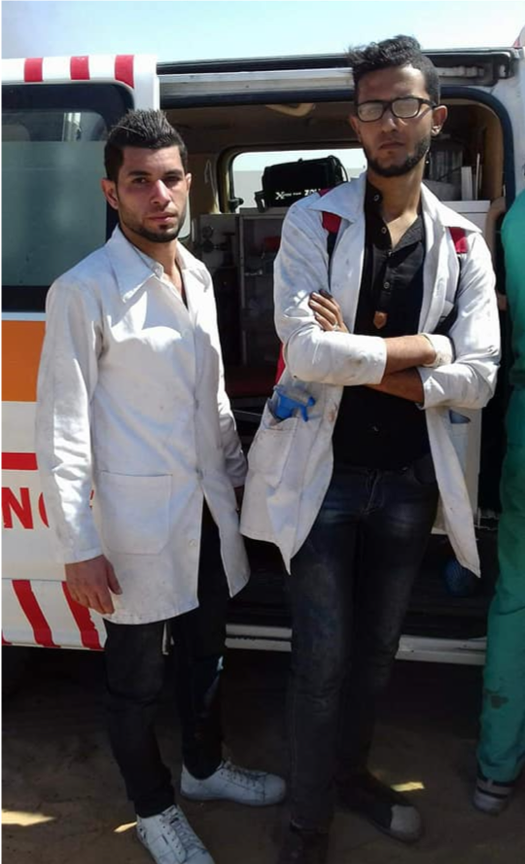 Abdullah Al-Qutati (right) volunteering as a first responder to treat those injured during demonstrations east of Rafah11 August 2018, Gaza – On 10 August, Abdullah Al-Qutati, a first responder, was killed by Israeli forces while working to help those injured during protests east of Rafah in the south of the Gaza Strip. He is the third health worker to be killed since demonstrations began as part of the Great March of Return in Gaza on 30 March. WHO reiterates that the protection of health workers, patients and health facilities must be respected.
Abdullah Al-Qutati (right) volunteering as a first responder to treat those injured during demonstrations east of Rafah11 August 2018, Gaza – On 10 August, Abdullah Al-Qutati, a first responder, was killed by Israeli forces while working to help those injured during protests east of Rafah in the south of the Gaza Strip. He is the third health worker to be killed since demonstrations began as part of the Great March of Return in Gaza on 30 March. WHO reiterates that the protection of health workers, patients and health facilities must be respected.
Abdullah was 22 years old and grew up in Tal As-Sultan in the south of the Gaza Strip. He was in the final year of his psychology degree at Al Aqsa University in Gaza City, and from January 2018 had been volunteering with Nabd Al-Hayat (Life’s Pulse), a team providing first aid training as well as mental health and psychosocial support around Rafah. Since the start of the Great March of Return, Abdullah and the Nabd Al-Hayat team had been volunteering as first responders during the demonstrations, at the Ministry of Health medical point east of Rafah. First responders provide immediate treatment and evacuation for those injured. Abdullah liked to be photographed in his white coat, and his colleagues say he was proud of the work he was doing and the service he could offer to his community.
Abdullah was shot on 10 August while providing care to a 55-year-old man who had also just been hit by live ammunition. Abdullah was shot at approximately 18:25 and was pronounced dead at 18:46 after he had been taken to the European Gaza Hospital. The injured patient he was treating at the time, Ali Al-Alol, also later died.
On 10 August, initial reports indicate that there were at least 5 incidents of attacks on health with 5 health workers injured besides Abdullah, and an ambulance damaged. These attacks are in addition to the 203 recorded incidents against health staff and facilities from 30 March to 3 August, which affected 373 health workers (2 of whom had died), 59 health vehicles and 2 health facilities. Overall, 164 people have been killed and 17 566 injured since the start of the demonstrations on 30 March, including preliminary figures released by the Ministry of Health for 10 August.
Dr Gerald Rockenschaub, Head of WHO in the occupied Palestinian territory, stated: “Our thoughts are with Abdullah’s family, friends and colleagues at this difficult time. The protection of health workers, patients and health facilities must be respected in accordance with international humanitarian law. Health workers like Abdullah should be able to carry out their work without fear and without risking their lives.”


